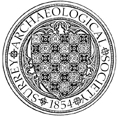The Roman Studies Group's November talk is on the subject of Roman glass. Professor Ian Freestone has kindly offered to talk to us about 'The Long Roman Glass Industry'.
By the latter part of the first millennium BCE, glassmakers in the southeastern Mediterranean were making their glass from a mixture of coastal sand and naturally occurring soda (“natron”) from Egypt. The raw glass was made in large tank furnaces on a scale of many tonnes and shipped in lumps around the ancient world, where it was re-melted and converted into artefacts. This technology allowed a significant up-scaling of the glass industry, accommodating developments in shaping processes such as slumping and blowing, so that large Roman public buildings could be furnished with many tens of tonnes of glass window and mosaic. This so-called natron glass dominated production until the eighth-ninth centuries, when new types of glass based upon the use of the ashes of burnt plants and trees became dominant in the Mediterranean and in northwestern Europe.
ian Freestone is Emeritus Professor of Archaeological Materials and Technology at the UCL Institute of Archaeology, an honorary visiting researcher at the British Museum and President of the Association for the History of Glass. His interests are in the composition, production and deterioration of artefacts and he has worked widely on ceramics, glass and metallurgy from all periods up to the nineteenth century. After 25 years working as a scientist in the British Museum, he joined Cardiff University as Professor of Archaeological Science and served as Head of Archaeology and Conservation before moving to UCL in 2011. He is author of over 200 articles and has co-edited nine conference proceedings. He received the Archaeological Institute of America’s Pomerance Medal for scientific contributions to archaeology in 2004. He is a member of the editorial boards of Archaeometry, Journal of Archaeological Science, Journal of Cultural Heritage and Journal of Glass Studies.
The Zoom link will be sent a week in advamce to RSG members. If you are a SyAS member you can join RSG for free - just click on the membership tab and follow instructions to join RSG.


